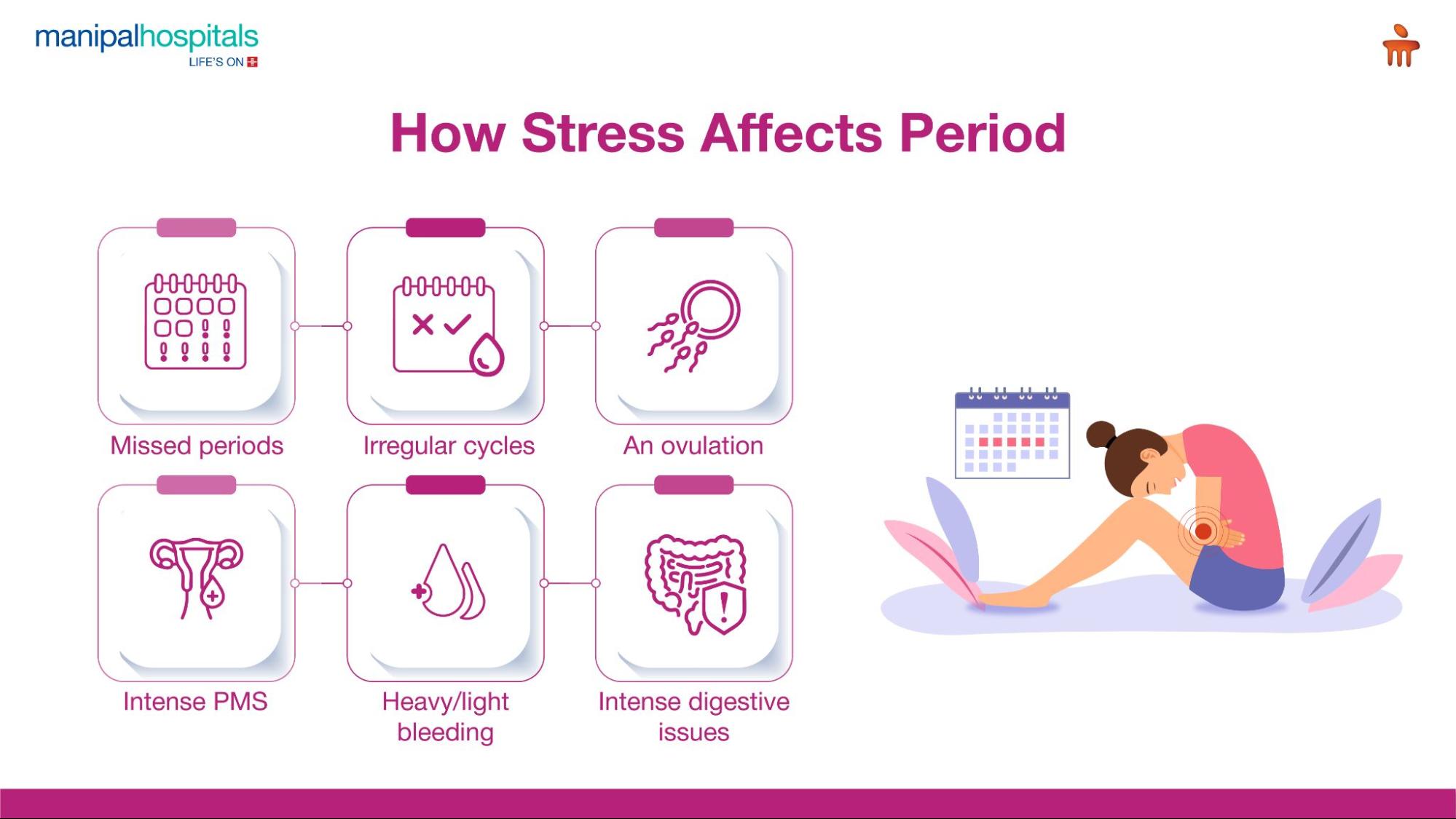Have you ever experienced a missed period or an irregular menstrual cycle during stressful times like exams or looming deadlines? You’re not alone. Stress, even when it feels routine or manageable, doesn’t just impact your mental well-being; it also affects your physical health, including your menstrual cycle. While short-term stress isn’t inherently harmful, chronic stress can be detrimental. It can alter your mood, trigger anxiety, cause headaches and digestive issues, and significantly affect reproductive health, often leading to menstrual irregularities.
One key concern is premenstrual syndrome (PMS), which is a group of physical and emotional symptoms that women usually experience before their periods. In India, the reported prevalence of PMS ranges from 14.3% to 74.4%. Stress is a major aggravating factor for PMS, with several studies indicating that higher stress levels are linked to more severe symptoms.1 Moreover, a study found that 14-25% of women of childbearing age suffer from menstrual irregularities, which is higher in females who are under constant stress.2 These figures highlight the real and pressing connection between stress and women’s menstrual health in India.
In this blog, we delve into the science to understand how stress affects menstruation, how stress impacts your menstrual cycle, and strategies for restoring balance.
Synopsis
Understanding the Menstrual Cycle
To understand how stress affects the period and how the menstrual cycle works. The menstrual cycle is a complex, coordinated process involving hormonal signals between the brain and reproductive organs.
Oestrogen and progesterone regulate the ovulation and endometrium
Follicle-stimulating hormone (FSH) and luteinising hormone (LH) control the development and release of the egg
Gonadotropin-releasing hormone (GnRH) helps in the secretion of FSH and LH through the pituitary gland
Each phase of your cycle, i.e., menstrual, follicular, ovulatory, and luteal, is tightly regulated by these hormones. Any disruption in this hormone balance can impact timing, flow, and ovulation.
Does Stress Affect Period?
Yes, many studies have shown that stress can affect your period. Stress affects the menstrual cycle by interfering with the body’s hormonal balance. The hypothalamus, a part of the brain responsible for regulating the menstrual cycle, is highly sensitive to stress.
During periods of chronic or acute stress, the body increases production of cortisol and adrenaline, which can suppress the hypothalamic-pituitary-ovarian (HPO) axis. This suppression reduces the levels of oestrogen and progesterone, hormones essential for maintaining a regular menstrual cycle.
Stress also activates the hypothalamic-pituitary-adrenal (HPA) axis, further contributing to menstrual disruptions and irregularities.
How Stress Affects Period: The Science Explained
Stress affecting period health is more common than most people realise, often leading to irregular cycles, increased period pain, heavier or lighter flow or even missed periods due to hormonal imbalances. In addition, chronic stress reduces fertility by interfering with ovulation, affecting egg quality, production and implantation. The risk of menstrual disorders like dysmenorrhoea and amenorrhoea also increases.

Stress can affect your period in many ways:
-
Activates the hypothalamic-pituitary-adrenal (HPA) axis
-
Increases levels of cortisol and corticotropin-releasing hormone (CRH)
-
Suppresses gonadotropin-releasing hormone (GnRH), disrupting FSH and LH secretion
-
Alters the cycle length and intensifies menstrual symptoms
-
Disrupts ovulation, which may not occur — a condition known as anovulation
It’s crucial to note that although stress can impact your period, not all people experience menstrual changes when they’re under stress.
Signs That Stress Is Affecting Your Period
The answer to the question: Does stress affect your period is clear now. Now, let’s uncover whether the menstrual changes you are experiencing are due to stress.
Stress often amplifies both physical and emotional symptoms, and that’s what you need to watch out for. These include:
-
Missed periods (amenorrhea)
-
Irregular cycles (shorter or longer)
-
Heavier or lighter bleeding
-
More intense PMS symptoms like bloating, breast tenderness, mood swings or increased cravings, headaches
-
Delayed or absent ovulation
-
Weight changes
-
Fatigue
While slight variations in the cycle due to stress are normal, if you experience any of these symptoms of menstrual imbalance frequently, seek consultation with a gynaecologist.
Managing Stress and Your Menstrual Cycle
To restore hormonal balance and your menstrual cycle, managing stress is essential. Controlling stress is not always possible, but these strategies can help in stress reduction, along with giving you a chance to regularise the menstrual cycle.
-
Try maintaining a healthy weight
-
Focus on eating a balanced diet
-
Prioritise quality sleep
-
Practice relaxation techniques like yoga, meditation, deep breathing, etc.
-
Limit the consumption of caffeine and alcohol
-
Practice menstrual hygiene
-
Keep the body hydrated by drinking enough water
-
Track and monitor your period cycle
-
Seek professional help if needed
FAQ's
Yes, digestive issues such as bloating, diarrhoea, nausea, and constipation are common before, during, or after menstruation. Stress can not only affect the timing and intensity of your period but also worsen these digestive symptoms, making your cycle even more uncomfortable.
Due to hormonal changes and uterine contractions, women experience stomach pain during menstruation, and its intensity varies from person to person.
As chronic stress disrupts the hormone production, it can completely stop periods, a condition called hypothalamic amenorrhoea.
You can schedule an appointment with our specialist at Manipal Hospitals, Mukundapur, by contacting us or visiting our website.
Visit: https://www.manipalhospitals.com/mukundapur/specialities/obstetrics-and-gynaecology/
Contact no: 033 6907 0001





















 6 Min Read
6 Min Read
















